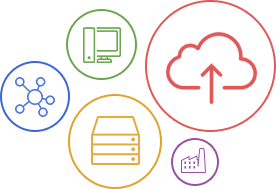
“I own a small business, who would want to hack me?” Now that the FBI has issued a warning for high-impact and indiscriminate ransomware campaigns, it’s better to be safe than sorry. After all, anyone with data dealing with financial information can be targeted by cyber criminals regardless of a business’ size. If you’re not well-versed in the realm of information technology, is there any way you could protect yourself and your business from these types of attacks?
Also read: What is a network maintenance plan and does your business need it?
Well, of course! But let’s go back to basics...
What is ransomware?
Ransomware is a form of malware that encrypts files on the victim’s computer or server and can only be accessed by paying cyber criminals a ransom. Simply put, ransomware is a type of cyber attack that locks your files and holds them hostage unless you pay up. However, that’s not the only thing that can harm your computer network.
Cyber criminals use various tools and channels to be able to steal your data. Some of the most common channels they use are email phishing campaigns, software and remote desktop vulnerabilities, and other password-based attacks. If you’re wondering how you can bolster your business’ online policies and procedures, you’re in luck. We compiled a list of tips for small businesses to improve computer network safety. Here are some of the different types of network security solutions you can use to ensure that your business is safe and secure.
Know your IT vulnerabilities
Believe us when we say that it only takes one data breach to ruin your financial stability. It’s understandable that your computer network and existing network vulnerabilities can take a back seat as small businesses already have enough on their plates. The best course of action to take a look at where your information is being stored and used and place the necessary security measures based on your needs. Remember, knowing your company’s network vulnerabilities means you’re one step ahead of cybercriminals.
Encourage the use of strong passwords
Are passwords important? Does two-factor authentication really work? Is it necessary for your employees to know the difference between a legitimate link and a harmful one? We can’t emphasize this enough - strong passwords mean another layer of security! Passwords play a vital role in making sure that your accounts are secure. Make sure that your passwords have eight characters or more and use a combination of letters and special characters. Another thing to consider is the use of 2FA (Two-Factor Authentication) which adds another layer of security by confirming whether or not you are the one trying to access your accounts.

Limit or control access to your network
Limiting or controlling access to your network refers to the practice of determining who can access your network and who can’t. According to Emil Isanov, CEO of ETech 7, “The main goal of controlled access is to minimize the risk of hackers getting into your system. This can mean restricting the access to sensitive data across an organization or a company’s network as well as restricting access to the various types of applications used by a company.”
Secure your WiFi
Your company’s WiFi network does more than just provide an internet hotspot for your devices, it can also act as a point of entry for individuals that want to harm your business. Some of the basics you can do are to ensure that your WiFi is password protected and isn’t readily accessible to the public.
Network security and maintenance plan
As your business grows and expands, the challenge of setting up and maintaining a fully functioning computer network becomes increasingly complicated. But first, what is a network maintenance plan? A network maintenance plan ensures that networks, servers, and workstations are working as they should. This depends on your company’s needs and what your infrastructure looks like. Most computer networks are complex and require monitoring and regular check-ups in order to ensure that everything is secure and up and running. Here are some of the benefits of a network security and maintenance plan:
-
Enhanced productivity
- Having a robust network security and maintenance plan will ensure that all the critical aspects of the network are monitored for potential network vulnerabilities. This means your employees wouldn’t have to worry about attacks or downtime and can focus on growing your business instead.
-
Increased network reliability
- A network maintenance plan should be proactive. It should be able to see attacks from a mile away while ensuring that instances of downtime are at a minimum.
-
Optimized connectivity
- Again, your business’ connectivity depends on your existing infrastructure and number of active devices. The devices in a network should be able to seamlessly connect and communicate with each other to ensure streamlined operations. A well-maintained network ensures that your connectivity is optimized thus making it easy for your employees and customers to access data and other resources.
-
Better recovery solution
- Not everyone knows about this but a strong network maintenance plan works hand-in-hand with disaster recovery and planning. It’s always best to cover all bases, right? An unforeseen event can cause damage or data loss in your network. However, having a network maintenance plan that works in conjunction with your disaster recovery measures provides businesses with a backup plan that’s essential in repairing and restoring your network’s healthy status.
Ever heard of disaster recovery and planning?
While we’re on the topic of disaster recovery, let’s talk about why it’s something that your business needs. Think of it this way, prevention is better than cure. Regardless of industry, business continuity is something we should never take for granted. Unpredictability is a constant of life. Tropical storms, earthquakes, power outages, and data breaches could all contribute to a business’ downtime or worse- failure. This is where disaster recovery and planning comes in.
Disaster recovery is simply a plan developed by your IT department or an outsourced IT consulting firm that allows a company to access and restore its data in the event of an unforeseen event. The main function of a disaster recovery plan is to quickly restore your systems, minimize downtime, and mitigate the risk of data loss. Developing, implementing, and maintaining a disaster recovery plan is an important, albeit tedious, process. Make sure that your disaster recovery plan is customized to fit your network’s needs. Never leave it up to guesswork.
Encrypt confidential information
This should be a no-brainer. Implementing encryption technologies on your company’s devices and removable media is going to protect your confidential information from unauthorized access while also providing strong security for your business’ data.
Update and backup your stuff
Network security wouldn’t be complete without ensuring that your software are regularly updated as new viruses, worms, Trojans, and other malware often exploit outdated applications and software. Another thing to keep in mind is to put a backup measure. Regularly backing-up all of the data in your network ensures that you have copies on-site or in the cloud.

IMPORTANT: Educate your employees
Having a holistic approach to securing your data and infrastructure would be useless if your employees can’t tell the difference between a secure website and a harmful one. You should also educate your employees about the basics of IT security. In educating your employees about the dos and don’ts of internet security and the latest threats, you are putting another layer of security to protect your business’ assets.
Disclaimer: This article contains some of the most basic steps you can take to keep your business safe from cyber attacks. Obviously, it's going to be difficult to walk everyone though more complicated processes like checking network firewall security, developing an intrusion prevention system, having unified threat management measures, or even network penetration testing. For those things, you need a specialist.
What else can you do?
If you don’t want the headache of reading pages upon pages of literature about network security, you can always hire a managed network services provider to take care of your cyber security needs. Managed network service providers exist to help your business cover your IT needs which, in return, allow businesses to easily predict costs and become more effective in its daily operations.
A managed service provider, or MSP, offers services such as network maintenance, server management, computer network management, server backup, network performance management, and network security to name a few. Now that most of us are still working from home because of the current COVID-19 pandemic, managed network service providers also provide remote network monitoring to always keep you safe.
If you’re interested in bolstering your network security, ETech 7 - a managed IT service provider based in New York City - offers free network checks to gauge the strength of your business’ security measures.












